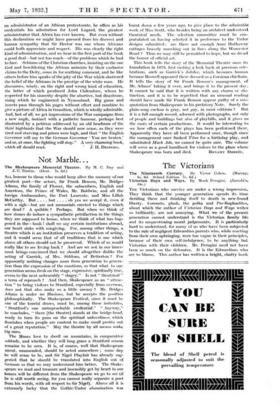Not Marble...
The Shakespeare Memorial Theatre. By M. C. Day and J. C. Trewin. (Dont. 7s. 6d.)
Au. honour to those who would keep alive the memory of our greatest poet—the actors, Sir Frank Benson, Mr. Bridges Adams, the family of Flower, the subscribers, English and American, the Prince of Wales, Mr. Baldwin, and all the foreign Ambassadors, the Poet Laureate, and Miss Lillah McCarthy. But . but . . . . oh yes we accept it, even if with a sigh—hut are not memorials erected to things which are dead ? A quibble ? Perhaps. But when we think of how stones do induce a sympathetic petrifaction in the things they are supposed to house, when we think of what has hap- pened in the—hush ! shall we say certain institutions abroad, our heart sinks with misgiving. For, among other things, a theatre which is an institution preserves a tradition of acting, and it would seem that of all traditions that is one which above all others should not be preserved. Which of us would really like to sec Irving back ? And are we not in our inner- most beings convinced that we should altogether dislike the acting of Garrick, of Mrs. Siddons, of Betterton ? For apparently nothing changes more from generation to genera- tion than the expression of the emotions, so that what to one generation seems fresh on the stage, expressive, spiritually true, seems to the next unbearably " stagey." Is not " theatrical " a term of reproach ? And then, Shakespeare as an " attrac- tion " to bring visitors to Stratford, especially from overseas, does not that also make us a little uneasy ? Mr. Bridges Adams is under no illusions, but he accepts the position philosophically. The Shakespeare Festival, since it must be one of the tourist draws, must be, among these industries, " Stratford's one unimpeachable credential." " Anyway," he concludes, " there [the theatre] stands at the bridge-head, ready to turn its guns on the spiritual unloveliness which nourishes when people are content to make small profits out of a great reputation." May the theatre by all means make big ones.
The Muses love to dwell on mountains, in comparative solitude, and whether they will long grace a Stratford season remains to be seen. It is, of course, well that Shakespeare uncut, unamended, should be acted somewhere ; sonic day he will cease to be, and Sir Nigel Playfair has already sug- gested that he should be translated into English out of German so that we may understand him better. The Shake- speare we read and treasure and insensibly get by heart in our homes will be different from the Shakespeare we go to see (if he is still worth seeing, for you cannot really separate a poet from his words, with all respect to Sir Nigel). Above all it is extremely lucky that the Gothic-Tudor abomination was
burnt down a few years ago, to give place to the admirable work of Miss Scott, who besides being an architect understood theatrical needs. The selection committee must be con- gratulated on having selected it in preference to the Tudor designs submitted ; are there not enough Anne Hathaway cottages bravely marching out in lines along the Worcester Road ? Thus we may still be permitted to hope, but we dread the horror of official art.
This book tells the story of the Memorial Theatre since its foundation in 1879, first casting a look back at previous cele- brations, such as Garrick's Jubilee, which becomes human because Boswell appeared there dressed as a Corsican chieftain. It tells the story of Sir Frank Benson's management, of Mr. Adams' taking it over, and brings it to the present day. It cannot be said that it is written with any charm or dis- tinction, and it is to be regretted that an unusual reading should have made Sir Frank Benson appear guilty of a mis- quotation from Shakespeare in his prefatory Note. Surely the plain-song cuckoo is gray, not gay, in most editions ? But it is a full enough record, adorned with photographs, not only of people and buildings but also of playbills, and it gives us the casts of certain productions. It would be interesting to see how often each of the plays has been performed there. Apparently they have all been performed once, though since the management once hulked Tilos for a birthday play, and substituted Much Ado, we cannot be quite sure. The volume will serve as a good handbook for visitors to the place where Shakespeare was born and died. BONAMY Doanfm.






































 Previous page
Previous page